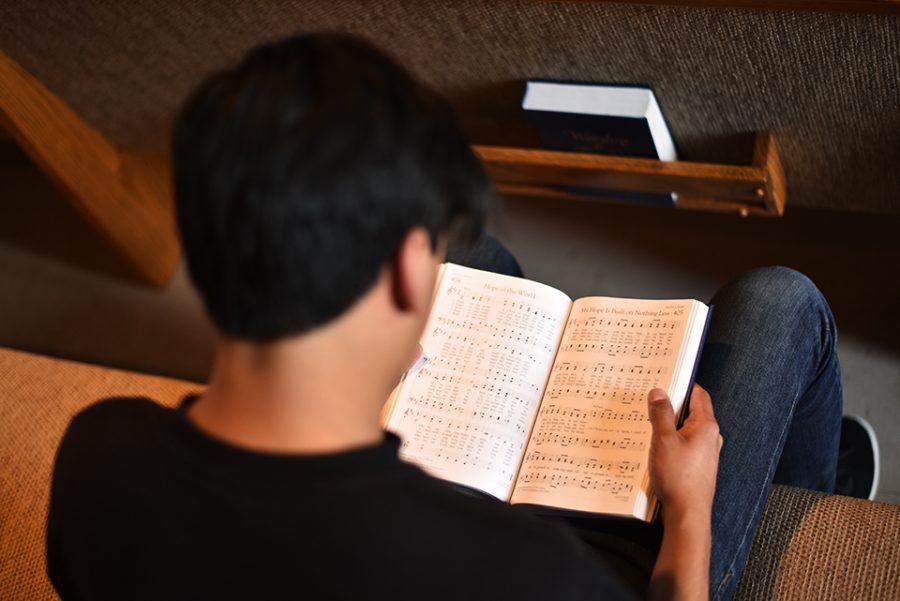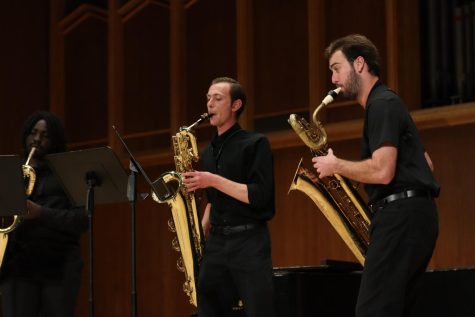Contemporary Christian music diverges from the style of hymns
Theologically rich hymns coexist with emotional and experiential contemporary songs.
May 17, 2017
Every culture on the planet expresses themselves through a multiplicity of different art forms, but the primary method is through music. The world is full of unique, diverse and exceptional music that reflects the attitude and worldview of its culture. Similarly, Christianity has a unique relationship with music. Throughout the entire history of Christendom, from the graceful psalms of David to the theologically rich hymns of Charles Wesley, music has been one of the principal methods used to worship God. However, worship music has changed throughout the years.
Saturated with theology
Many churches focus less on playing classic hymns such as “All Creatures of our God and King” and more on contemporary hits such as “Oceans: Where Feet May Fail” or “What A Beautiful Name.” However, many of these contemporary songs feature a different style of lyrics than hymns. Barry Liesch, founder of the Music in Worship program, talked about the difference between hymns and contemporary worship music. Liesch referred to famous hymn writers who were also prominent theologians such as Charles Wesley and Isaac Watts. Their background in theology enabled them to write hymns that were saturated with biblical theology and references to scripture.
“[The hymns] are immersed in scripture. Every line has an allusion to some scripture passage,” Liesch said. “Today, if you have a song writer they’re probably a musician, maybe, and they’re dealing with their experience and whatever they know about the scriptures, but it doesn’t come from usually a place of that depth. They’re not immersed in the scriptures in the same way.”
Liesch also mentioned a trend in contemporary worship music which focuses more on personal experience of God rather than scripture. He highlighted how most contemporary songs are written by musicians rather than theologians and sees this as a reason for the different style, which spotlights emotions, feelings and intimacy rather than doctrinal content. Liesch explained how this modern trend can lead to theologically weak songs.
“Some of them are a bit slogan-ish. They don’t get into enough detail,” Liesch said.
Playing on emotion
Sophomore music major Josh Durant noticed this tendency of appealing to the listener’s emotions, but he views it as a way to stir up the listener.
“Worship music does attempt to draw emotion from the listener to point them to God. That is the purpose of [music, art, poetry and literature],” Durant said in an email.
He also explained that many contemporary artists compose songs as testimonials that attempt to condense complex theological ideas into simpler language which feels more accessible than the hymns.
Durant also talked about the difference in structure between hymns and contemporary music. He mentioned that even though hymns have no chorus, they often contain verses which overflow with theology. Contemporary songs contain fewer verses and are also much more concise.
“Because of this, all of the teaching is focused into the verse. This, unfortunately, limits the amount that can be said in a verse without the fear of losing a congregation to too much diction,” Durant said in an email.
“A songwriter once mentioned that our songs should, ‘Take everyone to the classroom during the verses and take everyone to the chapel during the choruses,’” Durant said.
The classroom and the chapel
Durant emphasized how space for both exists in times of worship. Liesch also agrees that there is space for both styles of worship music.
“It’s not like every song has to teach. I mean not every psalm is digging into theology either. It has to express the whole range of our experience,” Liesch says.
The theologically rich verses of the hymns stand apart from the experiential lyrics of contemporary worship music, but one can find value in both of them. It is a matter of striking the most effective balance.
“At this point, it’s the role of the worship leaders to choose to lead songs that carry weight and simple songs that the congregation can immediately connect with,” Durant said.
Liesch also spoke of the necessity of this balance.
“You need a really great lyric, but you need a really great tune too,” Liesch says.
He explained songs which effectively balance theological weight and a captivating tune are the songs which truly stick around.







